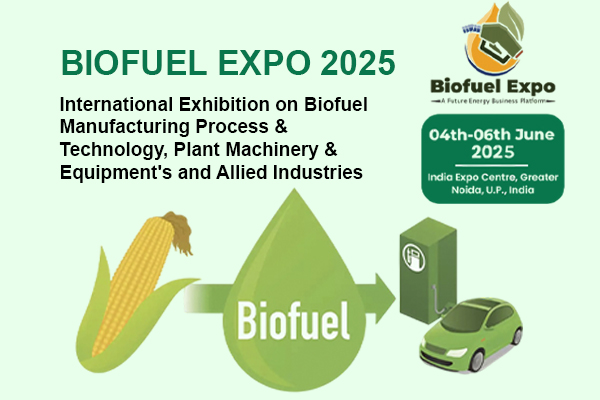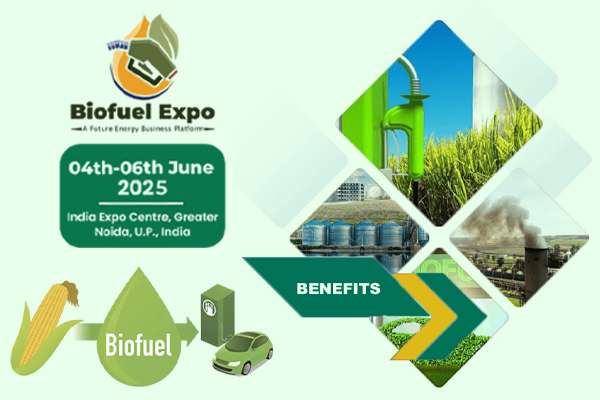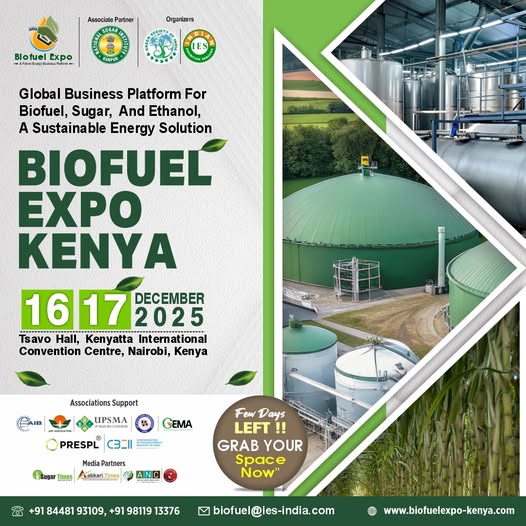
The world is evolving rapidly, and with the increasing concerns about climate change and environmental sustainability, industries worldwide are focusing on green and renewable energy solutions. Biofuels have emerged as one of the most promising alternatives to traditional fossil fuels. The International Biofuel Exhibition: Manufacturing & Technology stands at the forefront of this revolution, bringing together industry leaders, innovators, and experts to explore cutting-edge biofuel manufacturing processes, technologies, and related plant machinery and equipment.
In this blog, we will delve deep into the significance of biofuels, the role of technology in biofuel production, and why exhibitions like this are crucial for the industry’s growth. We will also explore the various technologies presented at the exhibition, how they contribute to the biofuel sector, and the future of biofuel manufacturing.
What is Biofuel and Why is It Important?
Biofuel is any fuel that is derived from biomass – organic materials like plants, algae, and waste products. These fuels are a cleaner alternative to traditional petroleum-based fuels, emitting fewer greenhouse gases and pollutants. Biofuels can be divided into several categories, including biodiesel, bioethanol, and biogas, each of which has different applications in transportation, industry, and residential uses.
The transition to biofuels is crucial for reducing dependency on fossil fuels, mitigating environmental impacts, and promoting energy security. Biofuels are renewable and have the potential to create a more sustainable energy future. With advancements in technology, the efficiency and scalability of biofuel production processes have increased significantly, making them a viable option for large-scale adoption.
The Role of Technology in Biofuel Manufacturing
Technology plays a vital role in making biofuel production more efficient, cost-effective, and environmentally friendly. Innovations in biotechnology, chemical engineering, and mechanical engineering have led to new processes that can extract more energy from raw materials, reduce waste, and minimize environmental impacts.
Key Technological Advancements that are Shaping the Biofuel Manufacturing Process Include:
1. Advanced Biofuel Production Techniques
Traditional biofuel production processes often rely on crops like corn and sugarcane, which can lead to concerns about food security and land use. However, with the development of advanced technologies, it is now possible to produce biofuels from non-food sources such as algae, agricultural waste, and even household waste. Algae-based biofuels, for example, have the potential to deliver significantly higher yields per acre compared to traditional biofuel crops.
2. Improved Biorefinery Processes
Modern biorefineries combine several processes to convert biomass into biofuels and other valuable products. New techniques such as gasification, fermentation, and transesterification have improved the efficiency of these refineries, allowing for higher yields and better quality biofuels. These technologies are essential for reducing the cost of biofuel production and making it more competitive with fossil fuels.
3. Automation and Control Systems
Automation and control systems are crucial for improving the consistency, quality, and efficiency of biofuel production. These systems allow for real-time monitoring and adjustments, ensuring that production remains within optimal parameters. They also help reduce the likelihood of human error and minimize waste.
4. Carbon Capture and Utilization (CCU)
As biofuel production grows, so does the need to manage carbon emissions. Carbon capture and utilization technologies allow for the capture of carbon dioxide produced during biofuel manufacturing and its conversion into valuable products like chemicals, fuels, or even building materials. This technology helps make biofuel production even more sustainable by reducing its carbon footprint.
5. Waste-to-Energy Technologies
Waste-to-energy technologies are another promising aspect of the biofuel industry. These technologies convert organic waste, such as food scraps, agricultural residues, and industrial waste, into biofuels. This not only provides a sustainable source of fuel but also helps solve the global issue of waste management.
The Significance of the International Biofuel Exhibition: Manufacturing & Technology
Exhibitions are a crucial platform for industries to showcase their innovations, share knowledge, and collaborate with peers. The International Biofuel Exhibition: Manufacturing & Technology serves as a comprehensive platform for biofuel manufacturers, technology providers, and stakeholders from around the world to come together and explore the latest trends, technologies, and solutions in the biofuel sector.
Here are some reasons why this exhibition is so important:
1. Networking Opportunities
The exhibition brings together key players from the biofuel industry, allowing manufacturers, suppliers, and technology providers to network, collaborate, and forge partnerships. This networking is essential for driving innovation and expanding the reach of biofuel technologies globally.
2. Showcasing Cutting-Edge Technologies
One of the main highlights of the exhibition is the opportunity to showcase the latest technological advancements in biofuel manufacturing. From new production methods to the latest machinery and equipment, attendees can explore a wide range of innovations that can help improve biofuel production processes.
3. Educational Sessions and Workshops
The exhibition features educational sessions, workshops, and panel discussions where experts from the biofuel industry share their knowledge and insights. These sessions provide valuable information on regulatory trends, market dynamics, and technological advancements, helping attendees stay ahead of the curve.
4. Promoting Sustainability and Green Energy
The exhibition plays a significant role in promoting sustainability and green energy practices. By showcasing sustainable biofuel technologies and manufacturing processes, the exhibition helps raise awareness about the importance of transitioning to renewable energy sources and reducing the carbon footprint.
5. Global Collaboration
The biofuel industry is a global endeavor, and international collaboration is essential for addressing the challenges of energy production and climate change. The exhibition provides a platform for countries and organizations to share their experiences, exchange best practices, and work together toward a more sustainable future.
The Future of Biofuel Manufacturing: Challenges and Opportunities
As the demand for clean energy solutions grows, the biofuel industry is poised for significant growth. However, challenges remain. These include the high cost of biofuel production, regulatory hurdles, and the need for technological improvements to increase efficiency.
Nevertheless, the future of biofuel manufacturing is bright, with ongoing research and development efforts focused on overcoming these challenges. The rise of alternative feedstocks, such as algae and waste materials, along with advancements in production technology, will continue to drive the biofuel sector forward.
Conclusion
The International Biofuel Exhibition: Manufacturing & Technology is a key event for anyone involved in the biofuel industry. It provides a platform for showcasing innovations, exchanging knowledge, and exploring the latest technologies in biofuel manufacturing. With sustainability and clean energy at the forefront of global discussions, this exhibition plays a critical role in shaping the future of biofuels.
As the world moves toward a greener and more sustainable energy future, biofuels will continue to play an important role in reducing dependency on fossil fuels and combating climate change. By supporting events like this, we can contribute to the advancement of biofuel technologies and accelerate the global transition to renewable energy.





















































